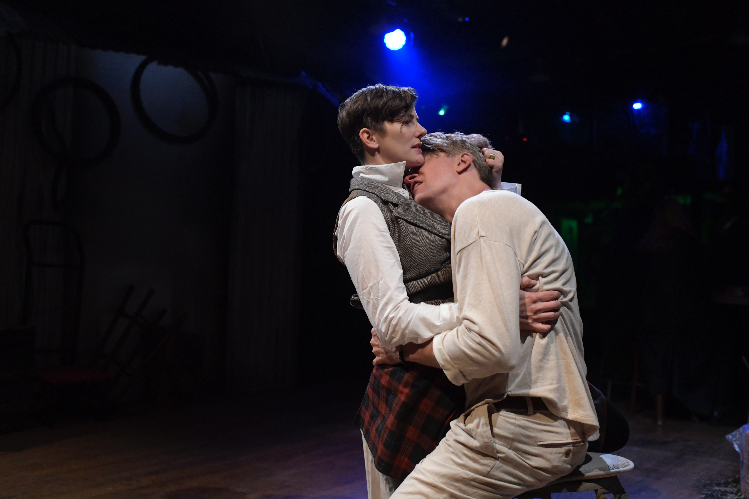Unsex Me Here: The Tragedy of Macbeth
By William Shakespeare; Directed by Maggie Cino
Produced by The Brick and Obvious Volcano
Off Off Broadway, Adaptation of a Classic
Ran through 11.23.19
The Brick, 579 Metropolitan Avenue
by Dan Rubins on 11.25.19
 Moira Stone and Mick O'Brien in Unsex Me Here: The Tragedy of Macbeth. Photo by Kent Meister.
Moira Stone and Mick O'Brien in Unsex Me Here: The Tragedy of Macbeth. Photo by Kent Meister.
BOTTOM LINE: A confusing concept blocks this well-acted Macbeth from being fully bewitching.
“Out, damned spot,” I guess? It’s not every Macbeth that leaves the audience bloodied, but I discovered midway through Unsex Me Here: The Tragedy of Macbeth that the thane and his lady had dripped some red liquid on the page of notes I was taking—and on my pants leg—as they exited up the aisle.
I’ll do my best to make out my handwriting through the stain, but that’s not the only blurriness that could use some clearing up. The tragedy of this Macbeth is that, much like a bloodstain on your program, a head-scratcher of a concept can distract from the freshly energized work happening all around it.
Unsex Me Here has gone for a fully gender-bent Macbeth, which could work sharply were it not for a double layer of swap. A program note—and nothing in the production itself—indicates that the action takes place in a post-climate apocalypse wasteland in which “this particular community made the decision to change how pronouns were used in order to upend the pre-apocalypse power structure...Cis-gendered men should be referred to as 'she' to establish their less powerful place in society” while “all other people are referred to as 'he.'"
In other words, even though it would appear (without reading director Maggie Cino’s program note) that Macbeth (Moira Stone) is a male character played by a female actor, the lead character is actually a female character who uses male pronouns. And while the divorcing of gender pronouns from the gender identities with which they’re normally identified might be sociologically interesting, it’s dramatically bewildering. When Malcolm (Kiebpoli Calnek) tells Macduff (Kristen Vaughan) to “dispute” his grief, or enact revenge, like a man and Macduff replies that he “must also feel it like a man,” does “man” now actually mean “woman”? Have gendered stereotypes switched position along with pronouns?
Asking questions is probably unhelpful since the adaptation (which is smoothly condensed to a briskly paced two hours, by the way) gets tangled in its own knots. Lady Macbeth (Mick O’Brien) gets to speak Macbeth’s line, “Bring forth men-children only,” which makes sense in the moment, since it’s Macbeth who has a uterus, but Lady Macbeth also describes nursing a child (“I have given suck”), which doesn’t make any sense at all. (There’s also something unsettling about the binary pronoun options in this world: why do non-binary people have to use only male pronouns now?)
If you need to give your concept a backstory, there’s probably something awry. Simply flipping the pronouns in the text (and eliminating the pronoun swap concept) might have fixed much of the confusion and kept the gendered focus central. (The climate change apocalypse element doesn’t really make much sense either—but I guess it has something to do with why they’re hoarding Twinkies?)
In contrast to John Doyle’s bloodless snoozer of a Macbeth currently playing at Classic Stage Company, Unsex Me Here at least keeps the blood pumping as best it can. The performers prowl and pounce throughout Mike Mroch’s apocalyptic junkyard, and Cino quickly constructs an evocatively uncanny wasteland world out of the cozy Brick Theater. Charlotte McPherson’s eerie lighting of the witches’ scenes, and Eric Nightingale’s soundscape of tinkling glass, make the Brick feel more expansive than it really is.
And, after all, maybe it was because I felt I had to force myself to listen harder to every line than I usually do, but Cino has coaxed some fresh, buoyant line readings from her cast. Best among the dozen actors is Kristen Vaughan as Macduff: whereas I’ve seen male after male Macduffs reveal the news of Duncan’s death—and then later react to the tidings of his own family’s massacre—with bellowing histrionics, Vaughan’s anguish is a gradual, suspenseful crescendo from stunned silence towards unmoored howls. The transformation of Macduff into an instrument of vengeance has never seemed more cogent.
I’ve seen a number of productions of Macbeth lately that over-emphasize the knotty scene in which Malcolm pretends that he himself would be unsuited for the crown in order to test Macduff’s principles: Kiebpoli Calnek, a striking, passionate Malcolm, comes pretty close to making the layered conversation work for the audience. There’s something surprising, too, in the insinuation that King Duncan (Hope Cartelli) would flirt shamelessly with Lady Macbeth: the discomfort in their one exchange is a keenly provocative twist on the usual showy hospitality.
It’s in these moments of thoughtful retelling that Unsex Me Here vaults above its over-articulated ambition.
(Unsex Me Here: The Tragedy of Macbeth played at The Brick, 579 Metropolitan Avenue, November 8-23, 2019. The running time was 1 hour 50 minutes without an intermission. Performances were Wednesdays through Saturdays at 7. For more information visit bricktheater.com.)
Unsex Me Here: The Tragedy of Macbeth is by William Shakespeare. Directed by Maggie Cino. Set Design by Mike Mroch. Lighting Design by Charlotte McPherson. Sound Design by Eric Nightingale. Costume Design by Karen Flood. Stage Manager is Berit Johnson.
The cast is Kiebpoli Calnek, Hope Cartelli, Rebecca Comtois, Ivanna Cullinan, Alex Guhde, Berit Johnson, Bob Laine, Mick O'Brien, Derrick Peterson, Kimberly Singh, Moira Stone, Adam Swiderski, and Kristen Vaughan.

